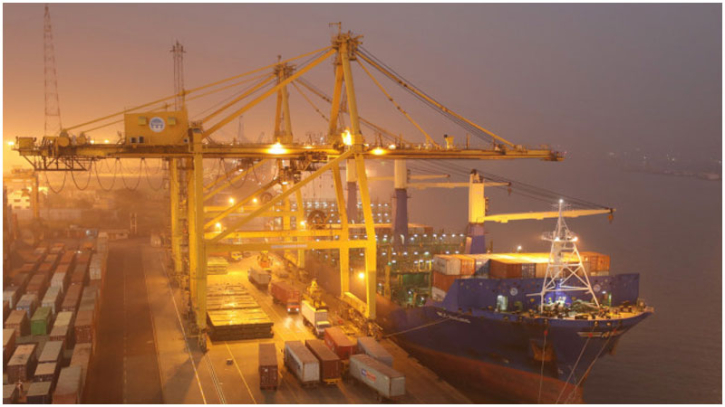Ctg Port to deliver 16 more products via private depots to ease congestion

To enhance the operational efficiency of Chattogram Port and reduce container congestion, the National Board of Revenue (NBR) has approved the off-dock/ ICD delivery of 16 additional types of imported products via private inland container depots (ICDs), the Business Standard reports.
The decision, which takes effect from July 17, is expected to allow the delivery of approximately 70,000 more import containers through these depots, according to ICD operators.
The newly approved products include milk and cream, coconuts, various fresh or dried nuts, sulphur, carbonates, polymers (including polyethylene and polypropylene), acrylic polymers, amino resins, finishing agents, paper and paperboard, ceramic tiles, and other chemical and industrial items.
With this addition, a total of 66 types of imported goods are now permitted for off-dock delivery. Previously, 50 categories—including essential food items such as rice, wheat, pulses, and mustard seed—were allowed.
Ruhul Amin Sikder, Secretary General of the Bangladesh Inland Container Depots Association (BICDA), said the inclusion of these 16 items will increase ICDs' share of import handling from 20% to 25% of the port's total imported cargo. "Currently, 19 private ICDs handle about 300,000 TEUs of imported goods annually. With the addition of these new items, we will be able to increase that number significantly," he added.
Export operations are already fully dependent on ICDs, with 100% of goods exported through Chattogram Port being stuffed into containers at these off-dock facilities. Additionally, designated imported goods and empty containers are stored and processed at ICDs as per NBR guidelines.
The ICDs have a collective handling capacity of around 100,000 TEUs, with 10,000 TEUs allocated for imports and 8,000 TEUs for exports during regular operations. However, they can manage up to 15,000 TEUs of imported containers when needed, Sikder said, expressing confidence in their ability to handle the additional items.
Currently, 19 ICDs are in operation for both imports and exports, while two additional ICDs—Anchorage and Bay Link—are managing empty containers. Anchorage has recently been approved by the NBR to begin handling imported goods, and once both new facilities are fully operational, the depot sector's capacity will see further growth. BICDA has also confirmed that the AK Khan Group has initiated the construction of another new ICD.
This is the second such move this year. On April 8, the NBR allowed 12 new products for off-dock delivery, including staple fibre, calcium carbonate, polystyrene, quicklime, fluting paper, unwrought aluminium, and cinnamon.
The move aligns with recommendations made by a US Coast Guard delegation during its 2017 visit to Chattogram Port. The team had issued 16 observations regarding port operations, one of which was to shift cargo delivery operations away from the port yard to enhance security and operational efficiency under the ISPS Code. While several measures have been implemented since then, full relocation of delivery activities is yet to be achieved.
Chattogram Port handled 3,296,067 TEUs in the 2024–25 fiscal year, comprising 1,786,212 TEUs of import and 1,509,855 TEUs of export containers, according to official data.
As part of its broader strategy, the Chattogram Port Authority is working to transfer all full container load (FCL) deliveries to ICDs and move around 10,000 TEUs of auctionable containers to the Off-Dock in phases. A committee comprising representatives from the port, customs, and ICDs is being formed to oversee the process.
Port Secretary Md. Omar Faruk said the NBR's approval came in response to a proposal submitted by the Chattogram Port Authority, aimed at relocating more import deliveries to ICDs. "This decision will help decongest the port and improve the overall efficiency of cargo handling," he noted.
Second Secretary of the NBR Md. Al Amin told TBS that the decision was made following recommendations from the Chattogram Custom House. Three conditions have been set for implementing the expanded delivery:
All containers must be scanned before leaving the port for off-docks. The port authority must ensure the delivery of the approved goods to the ICDs. The Commissioner of the Chattogram Custom House may approve dual delivery (either from the port or ICD) in special circumstances.
Despite the positive reception, stakeholders have urged caution. Mahfuzul Haque Shah, a former director of the Chattogram Chamber of Commerce and Industry, welcomed the move but stressed that care must be taken to ensure that the shift does not lead to additional costs or delays for importers. "The private depots must have the logistical readiness to handle the extra load efficiently," he warned.
.png)




